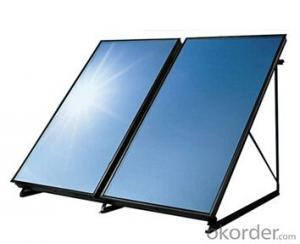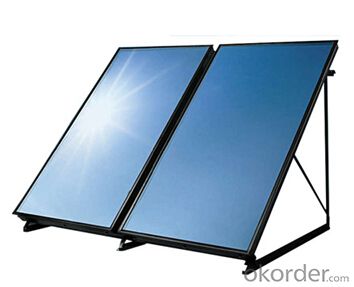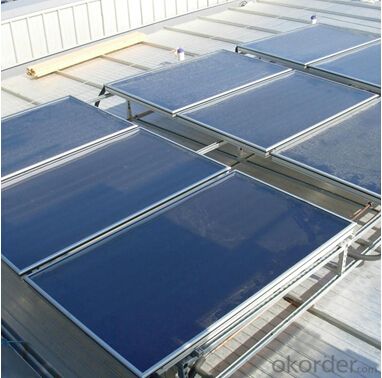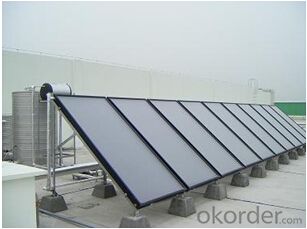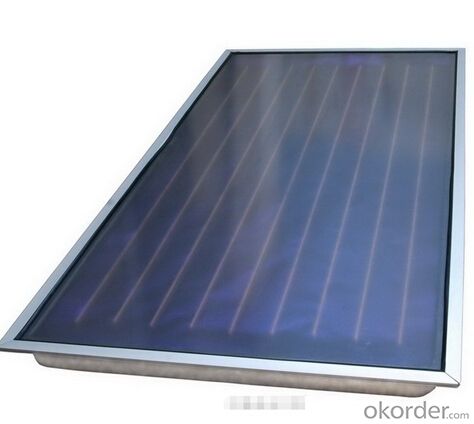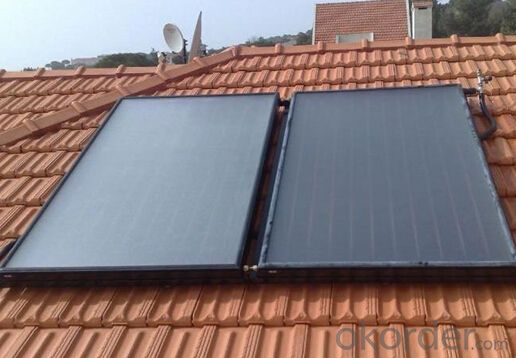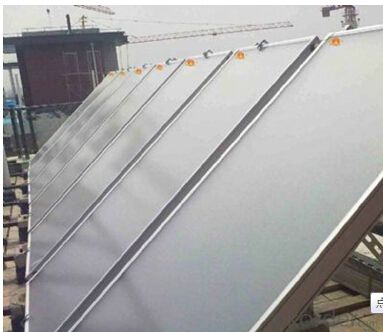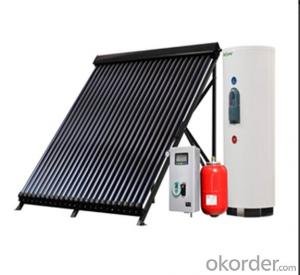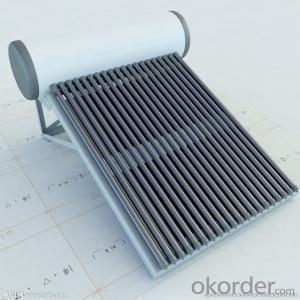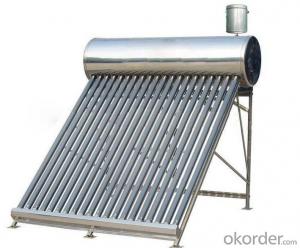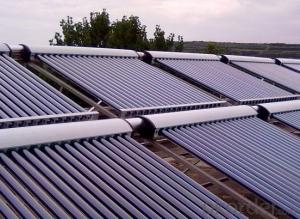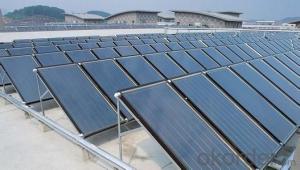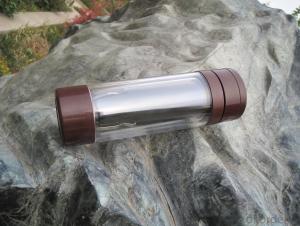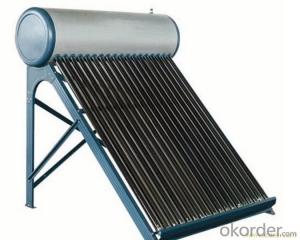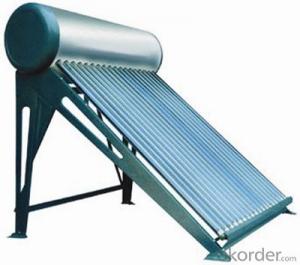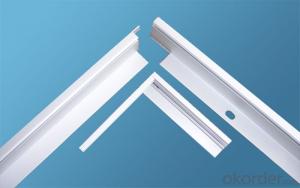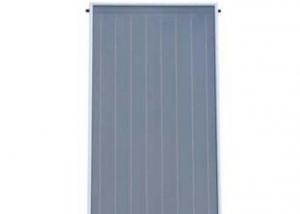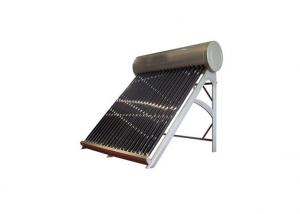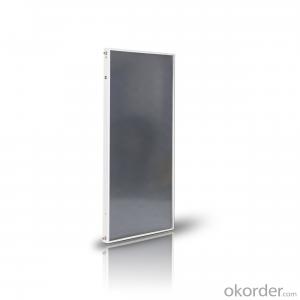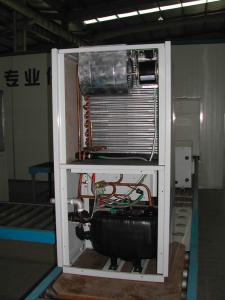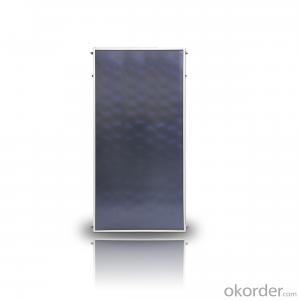High Quality Solar Water Heating System with Aluminum Alloy Frame and Circulation Pump
- Loading Port:
- China main port
- Payment Terms:
- TT OR LC
- Min Order Qty:
- 10 set
- Supply Capability:
- 10000 set/month
OKorder Service Pledge
OKorder Financial Service
You Might Also Like
Introduction of Non-Pressure Solar Water Heater:
Non-pressure Solar Heater is one of the most economical solar water heating device with pretty high efficiency at the same time. It consists of hot water storage tank, solar vacuum tubes with mouth plug in storage tank, and bracket supporting tank and tubes.When cold water in evacuated tubes is heated with solar irradiation, as the specific gravities of hot water and cold water are different, hotter water goes upward to storage tank and colder water goes downward to glass tubes. through this continuous circulation, the cold water in storage tank will be gradually heated till sunset.
Solar water heaters working principle
1. The solar collector absorbs solar energy and transmits it to the solar water heater tank through circulation
2. When the temperature of the collector reaches the set value, the controller starts the circulation pump automatically
3. The circulation pump makes heat-conducting liquid circulate automatically
4. The heat-conducting liquid transfers heat to water by lower heat exchanger in the water tank.
5. When the temperature difference between solar collector and heat pipe solar water heaters tank doesn't reach the set value, the circulation pump will be shut automatically
6. In case the temperature of the water tank does not reach Tmax, Electric Heating Element will start to work automatically
Solar water heaters working station component:
1. Operating screen
2. Manometer
3. Pump speed adjust switches
4. Temperature difference circulation pump
5. Flow rate indicator
6. Return circuit connector
7. Safety valve
8. Expansion vessel connector9. Return circuit connector
10. Wall mounting
11. Expansion vessel:8L
12. Pressure resistance: 10 bar pressure for expansion vessel
Solar water heaters specification:
Description | solar water heaters |
Material of out manifold | 0.55mm thickness color steel/ fluorine carbon steel |
Material of inner tank | Food grade 2.0 mm thickness SUS304 stainless steel |
Tank insulating layer | 40mm 45kg/m³ high-density polyurethane foamed |
Inlet and outlet hole | Male G1'' |
Max pressure | 0.6 Mpa |
Solar collector tube | 3.3 Borosilicate glass with N/Al coating |
Thickness of glass tube | 1.6mm |
Vacuum tube tightness | P≤0.005 Pa |
Absorption | as=0.93-0.96 (AM1.5) |
Emission ratio | εh=0.04-0.06 (80C±5C) |
Idle sunning property parameters | Y=220~260m2.C/KW |
Average heat loss coefficient | ULT=0.6~0.7W/(m2.C) |
Bracket: | 2.0mm thickness aluminum alloy |
Tank weight | 75KGS |
Tank size | 560mm Dia x 1810mm Height |
Tank capacity | 300L |
Solar collector | 2pcs 58x1800x15tube solar collector |
Absorber area | 2.811 m² |
Working station | SP116 working station |
Heat exchanger length | Upper:12m, Underside:18m |
Solar water heaters details show:
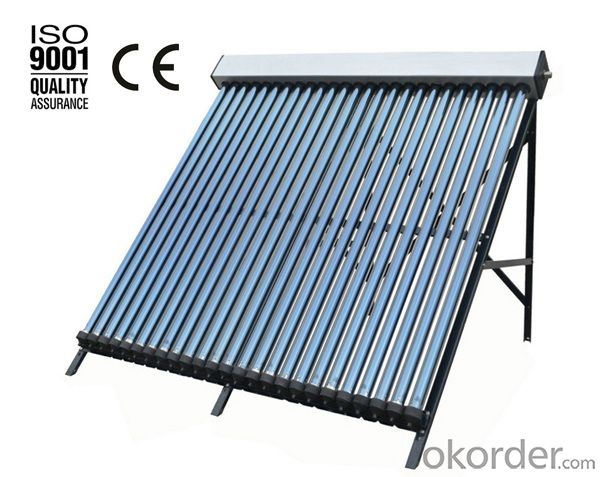
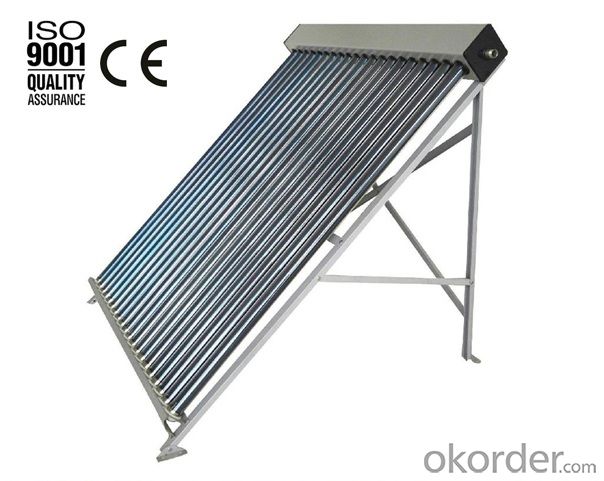
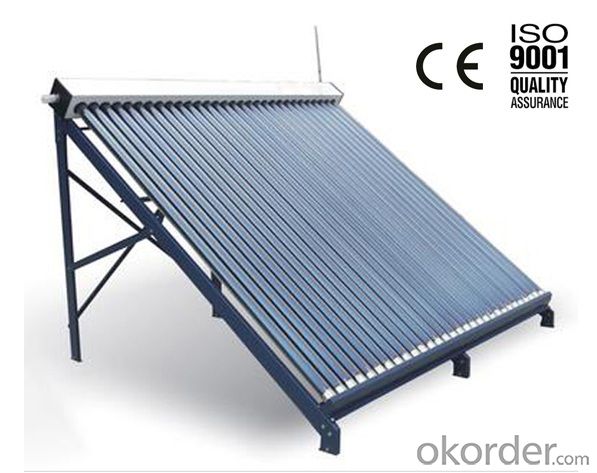
Benefits of this kind of solar water heaters:
1. Prolong the life of your existing water heater
2.Costs less than an electric, gas or oil water heater
3.No maintenance required
4.Lasts longer than a traditional hot water heater
5.Reduce your water heating costs
- Q: How does a solar water heater perform in areas with high levels of air pollution?
- A solar water heater's performance can be affected in areas with high levels of air pollution. The efficiency of the solar collector may decrease due to the reduced amount of sunlight reaching the system's components. Additionally, the accumulation of pollutants on the surface of the solar panels can further lower their effectiveness. Regular cleaning and maintenance may be required to ensure optimal performance in such areas.
- Q: Can a solar water heater be used in areas with limited access to plumbing?
- Yes, a solar water heater can be used in areas with limited access to plumbing. Solar water heaters can be designed to work with various plumbing systems, including gravity-fed systems or systems that rely on minimal plumbing infrastructure. In such areas, water can be manually filled into the solar water heater, and the heated water can be collected or distributed through simple mechanisms like buckets or containers. This makes solar water heaters versatile and suitable for use in areas with limited plumbing access.
- Q: Can a solar water heater be used in areas with limited access to water filtration systems?
- Yes, a solar water heater can be used in areas with limited access to water filtration systems. Solar water heaters utilize the energy from the sun to heat water, and they can be installed and used in any location as long as there is access to sunlight. However, it's important to note that a solar water heater does not provide water filtration or purification capabilities. So, while it can heat water, it does not address the issue of water quality. If the water supply in the area is not properly filtered or purified, additional measures would need to be taken to ensure the water is safe for use.
- Q: Can a solar water heater be used in remote locations with limited access to electricity?
- Yes, a solar water heater can be used in remote locations with limited access to electricity. Solar water heaters rely on the energy from sunlight to heat water, so they do not require a constant electrical power supply. This makes them suitable for remote areas where electricity is scarce or unreliable. The sunlight is converted into heat energy through solar panels, which in turn heat the water stored in the system. Therefore, as long as there is sufficient sunlight available, a solar water heater can effectively operate in remote locations.
- Q: Can a solar water heater be used in areas with saltwater or brackish water?
- Yes, a solar water heater can be used in areas with saltwater or brackish water. However, it is important to take certain precautions and use appropriate materials to ensure the longevity and efficiency of the system. Saltwater or brackish water can corrode and damage the components of a solar water heater if proper measures are not taken. One common method to protect the system is to use corrosion-resistant materials such as stainless steel or plastic for the piping and storage tanks. These materials are less susceptible to the corrosive effects of saltwater. Additionally, regular maintenance and cleaning of the system can help prevent the buildup of salt deposits and ensure its optimal performance. It is also recommended to install a water softener or desalination system in areas with high salt content in the water. These systems can help remove or reduce the salt content, minimizing the potential damage to the solar water heater. Overall, with the right precautions and maintenance, a solar water heater can be successfully used in areas with saltwater or brackish water, providing an environmentally friendly and cost-effective solution for hot water needs.
- Q: What are the common maintenance issues with a solar water heater?
- Some common maintenance issues with a solar water heater include scaling or mineral buildup, leaking or damaged pipes, malfunctioning temperature or pressure valves, and issues with the solar collector such as cracks or damage. Regular inspection, cleaning, and servicing can help prevent and address these issues.
- Q: What is the impact of water flow rate on the performance of a solar water heater?
- The water flow rate has a significant impact on the performance of a solar water heater. A higher flow rate allows for more efficient heat transfer from the solar collectors to the water, resulting in faster heating and increased hot water output. Conversely, a lower flow rate may lead to inadequate heat transfer and slower heating times. Therefore, maintaining an appropriate water flow rate is crucial for optimizing the performance and efficiency of a solar water heater.
- Q: Can a solar water heater be used in areas with high air pollution?
- Yes, a solar water heater can be used in areas with high air pollution. While air pollution may affect the efficiency of the solar panels to some extent, it would not completely render them unusable. Regular maintenance and cleaning of the panels might be necessary to ensure optimal performance.
- Q: Can a solar water heater be connected to an existing water heating system?
- Yes, a solar water heater can be connected to an existing water heating system. By integrating a solar water heater into an existing system, the solar energy can be used as a supplementary or primary heat source, reducing the reliance on traditional energy sources and thereby increasing energy efficiency and cost savings.
- Q: What is the average cost of a solar water heater?
- The average cost of a solar water heater can range from $3,000 to $7,000, depending on factors such as size, type, and installation requirements.
Send your message to us
High Quality Solar Water Heating System with Aluminum Alloy Frame and Circulation Pump
- Loading Port:
- China main port
- Payment Terms:
- TT OR LC
- Min Order Qty:
- 10 set
- Supply Capability:
- 10000 set/month
OKorder Service Pledge
OKorder Financial Service
Similar products
Hot products
Hot Searches
Related keywords
